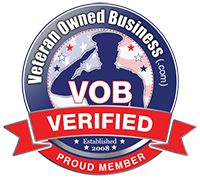I’m a little late to the party but here we go. We had been noticing that we just were not getting the eggs like we had been. Now there are reasons for this:
- Lazy. We just were not checking the boxes everyday and in the winter they freeze and burst and the girls, well, they get hungry and everybody likes chicken.
- The decrease in daylight. Production just goes down as the days get shorter.
- Water. During the summer they had watering cups in the run and your normal galvanized waterer out in the bigger open run. When freezing started we took our rain barrel and added a fish tank heater and circulation pump which runs to a pvc pipe with nipples. This prevents the water from freezing, keeps the water moving which keeps stagnation at bay and also keeps warm water constantly moving through the entire system. The nipples might make them feel like they just are not able to get as much water as easily and eggs are mostly water.
- Stress. In the winter things get boring we all feel the blues. Plus a few months ago a guinea hen wandered up here from parts unknown. We put her in the flock to keep her safe and waited to see if anyone came to claim her, they did not. I think it stressed the flock out.
It is possible that all of these things happening in a short time span caused them to go on strike. We have not changed foods other than I could not find scratch grains anywhere in town so we added cracked corn. I’ve done this in the winter to help boost their body temps. You don’t have to search the web to hard to find videos and articles about commercial foods perhaps being behind the lack of eggs.
Two things jumped out at me the first was fermenting food and the second was making your own food. One of the posters had switched from making their own to buying Kalmbach foods.
https://www.kalmbachfeeds.com/product-category/poultry/
I started researching their foods and the company and discovered that they are a local family owned business. Well local in that they started in Ohio and now have plants in Indiana and Michigan. The two that I decided to try are the pellets and the meat bird food.
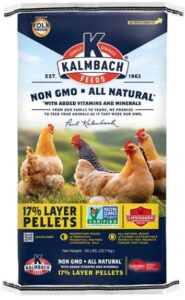
Layer food intended to be used as the sole on demand flock food.
The pellets are all natural, non-gmo, contain essential amino acids and top calcium levels. They also have YolkProud and LifeGuard which are proprietary to Kalmbach Feeds. LifeGuard is a bland of prebiotics, probiotics, essential oils, and digestive enzymes specifically designed to support gut health, immune function, and the digestive system of poultry. YolkProud has all natural ingredients to promote vibrant egg yolks.
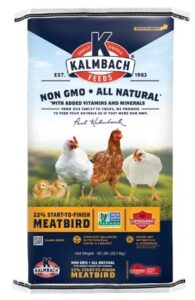
Feed as sole ration to broilers, ducks, geese, turkeys, and other meat type poultry.
The meat bird food is to boost the protein in their diet which could impact egg production and also help them to keep their body temps up for winter. This food is designed for broilers and meat-type poultry from hatch to market. Helping to increase energy levels to meet the demands of fast growing poultry types. While these are laying hens in the winter having a little more energy and perhaps being able to put more weight on isn’t a bad thing. The extra weight can be converted into energy to assist in keeping warm. Rumor is that the higher the protein the better the feathers. Our girls need some help in the feather department. Max might be a little to rough in his romance.
I started making fermented food from the pellets to add to their daily diet.
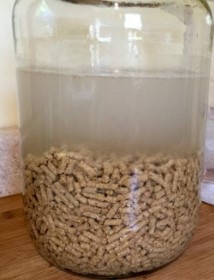
Fermenting dry layer pellets, picture immediately after adding water to pellets.
According to the internet and the internet never lies, you can use any kind of food to do this. Crumbles, pellets, the mixes we have pellets so that’s what I’m using. I think they are enjoying it because they can kind of drink it. If the temps are at or below freezing they won’t get this till it warms up. Everyday you do have to clean out whatever bowl or feeder you use for this because it would mold and it would probably attract unwanted rodent attention. But the positives of this make sense to me. It helps their gut health, they get more liquid, it should be easier to digest so the delivery of nutrition is quicker because it’s already broken down before it hits the stomach, that should also increase the bodies ability to absorb needed nutrients, and it’s not hard to do and doesn’t cost any money. People say that it will decrease the overall amount of food they eat because they will feel fuller. I can’t speak to that, yet. The system, for me, is to use a 1/3 dry food to 2/3 water mix. The water is well water no softener salt no chlorination. I cover the container with a paper towel, I stir it three times a day. I don’t know if this is important or not but I try to keep at least an inch of water on the top at all times. It should smell good as good as chicken food can smell if it smells sour or you see mold or anything gross just toss it. Think of it like eating oatmeal. You add the water and cook it the oats swell you eat them and you feel full. Now I’ve never taken a hand full of oats raw and eaten them to see if it would have the same effect but I imagine it would not.
We add apple cider vinegar with the mother to their water and I’ve added plain yogurt (that I make from grocery store whole milk with a yogurt starter) and even raw milk from a local dairy farmer is it the cure for things? I don’t know but it’s good in general, raw milk controversy aside, so making that part of their diet while not making it their entire diet should not do any harm.
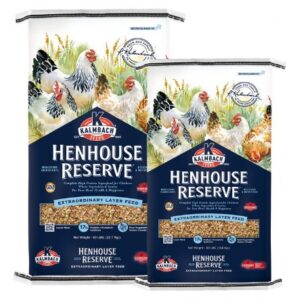
Henhouse Reserve is better than scratch grains because it is a complete food for chicks over 16 weeks old.
Next time I go to the store I’m going to pick up a bag of Kalmbach Henhouse Reserve. This is actually what I went to the store to get and I messed up and got the pellets. That’s okay I don’t really think you can make a mistake with these feeds. I was just really intrigued by this one because it looks like scratch grains but it’s supposed to be a super food for them. It still has the YolkProud and LifeGuard blends, plus it is fully-fortified with vitamins, minerals, and amino acids to produce strong shells and tasty eggs. What really sold me on it is that you can SEE the whole grains and vegetables in it!
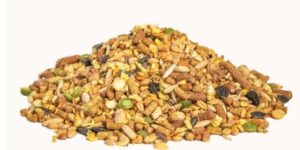
Look at that, it looks like wholesome foods.
I mean that looks great, it looks like what I would make from scratch for them if I was making my own. Let’s face it the cost of just about everything has gone crazy. I’ve priced the bags of grain in the feed stores and to make this food would be an investment. Back in the day when we had over 100 birds up here it would have been more cost effective I think. Just simply because of the volume of food we would go through every week. But now with the 9 that we have I worry that it would start to mold or have other problems just from the amount of time it would take them to eat it all. Especially with adding fermentation into their diet.
But for now I think we have a good food from a company that seems like it has made a commitment to the people and animals they are producing food for. I’m excited to see what if any changes we see in the chickens overall health and egg production. Right now that might be even more important because in the next couple of months we will be incubating some eggs to add to the flock. So getting everybody healthy and happy will increase our success in that next step.

